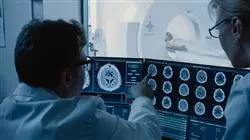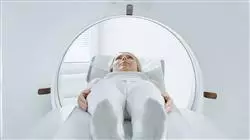University certificate
The world's largest faculty of information technology”
Why study at TECH?
The best program to specialize in Big Data and its tools applied to the Telemedicine sector and 100% online"

The advances that have been made in the area of Telemedicine have made it possible to implement increasingly specialized and effective diagnostic and treatment strategies in clinical practice, optimizing processes and generating new intervention techniques. This has been possible thanks to the development of Big Data, which has favored the massive processing of data and its storage, creating, additionally, algorithms through which computer systems analyze information and automate a series of processes. This not only saves time and costs, but has also favored the emergence of cutting-edge methods related, for example, to the analysis of biomedical images.
The acceptance of this area within E-Health has created a very large labor demand for IT professionals, not only to continue research and development work, but also to ensure optimal and guaranteed maintenance of existing ones. However, in order to carry out these tasks, the professional must have a detailed knowledge of the field in question, which is why this Postgraduate diploma comes at the best time. This is a comprehensive and cutting-edge program based on the latest developments in Telemedicine. Through 450 hours of training, the graduate will be able to delve into the techniques of recognition and intervention through biomedical images, the application of Big Data in Medicine and the adaptation of artificial intelligence and IoT to this sector.
All this over 6 months and through a 100% online program, which, in addition to collecting the latest information, includes additional high quality material: detailed videos, research articles, self-knowledge exercises, complementary readings, dynamic summaries and much more! In this way, the computer scientist will be able to access a program adapted to their needs and those of the current market, and with which they will reach the peak of their professional career in a booming area such as E-Health.
Would you like to know in detail the most cutting-edge and specialized medical mass data processing strategies? Enroll in this program and become an Expert in 6 months"
This Postgraduate diploma in Biomedical Image Analysis and Big Data in E-Health contains the most complete and up-to-date educational program on the market. The most important features include:
- The development of practical cases presented by experts in biomedical imaging and databases
- The graphic, schematic, and practical contents with which they are created, provide practical information on the disciplines that are essential for professional practice
- The practical exercises where the self-evaluation process can be carried out to improve learning
- Its special emphasis on innovative methodologies
- Theoretical lessons, questions to the expert, debate forums on controversial topics, and individual reflection assignments
- Content that is accessible from any fixed or portable device with an Internet connection
You will have additional diverse material to deepen your knowledge in areas such as magnetic resonance imaging, its clinical applications and its physical foundations so that you can get to know them from the inside and in their entirety"
The program’s teaching staff includes professionals from the sector who contribute their work experience to this educational program, as well as renowned specialists from leading societies and prestigious universities.
Its multimedia content, developed with the latest educational technology, will allow the professional a situated and contextual learning, that is, a simulated environment that will provide an immersive training programmed to train in real situations.
The design of this program focuses on Problem-Based Learning, in which the professional will have to try to solve the different professional practice situations that will arise throughout the academic course. For this purpose, the student will be assisted by an innovative interactive video system created by renowned experts.
Thanks to the specificity of the program, you will be able to delve into the current and future applications of artificial intelligence and IoT to Telemedicine"

This Postgraduate diploma is defined in three words: flexibility, comprehensiveness and avant-garde. Would you like to check it out?
Syllabus
In order to offer a widely beneficial academic experience for the professional development of its graduates, TECH has included in this Postgraduate diploma the latest developments in the Telemedicine sector. Thanks to this, the computer scientist will be able to implement to their knowledge the most innovative applications of artificial intelligence, Big Data and IoT to their daily practice: algorithms for biomedical image processing, GPU acceleration tools, Cloudtechnologies, structural genomics and much more! All this in a 100% online way, without schedules, face-to-face classes or access limits.

Thanks to this program you will be able to develop extensively in the development of strategies related to computed tomography and magnetic resonance imaging, something that the medical sector will be grateful for"
Module 1. Techniques, Recognition and Intervention using Biomedical Imaging
1.1. Medical Imaging
1.1.1. Modalities in Medical Imaging
1.1.2. Objectives in Medical Imaging Systems
1.1 3. Medical Imaging Storage Systems
1.2. Radiology
1.2.1. Imaging Method
1.2.2. Radiology Interpretation
1.2.3. Clinical Applications
1.3. Computed Tomography (CT)
1.3.1. Principle of Operation
1.3.2. Image Generation and Acquisition
1.3.3. Computerized Tomography. Typology
1.3.4. Clinical Applications
1.4. Magnetic Resonance Imaging (MRI)
1.4.1. Principle of Operation
1.4.2. Image Generation and Acquisition
1.4.3. Clinical Applications
1.5. Ultrasound: Ultrasound and Doppler Sonography
1.5.1. Principle of Operation
1.5.2. Image Generation and Acquisition
1.5.3. Typology
1.5.4. Clinical Applications
1.6. Nuclear medicine
1.6.1. Physiological Basis in Nuclear Studies. Radiopharmaceuticals and Nuclear Medicine
1.6.2. Image Generation and Acquisition
1.6.3. Types of Tests
1.6.3.1. Gammagraphy
1.6.3.2. SPECT
1.6.3.3. PET
1.6.3.4. Clinical Applications
1.7. Image-Guided Interventions
1.7.1. Interventional Radiology
1.7.2. Interventional Radiology Objectives
1.7.3. Procedures
1.7.4. Advantages and Disadvantages
1.8. Image Quality
1.8.1. Technique
1.8.2. Contrast
1.8.3. Resolution
1.8.4. Noise
1.8.5. Distortion and Artifacts
1.9. Medical Imaging Tests. Biomedicine
1.9.1. Creating 3D Images
1.9.2. Biomodels
1.9.2.1. DICOM Standard
1.9.2.2. Clinical Applications
1.10. Radiological Protection
1.10.1. European Legislation Applicable to Radiology Services
1.10.2. Safety and Action Protocols
1.10.3. Radiological Waste Management
1.10.4. Radiological Protection
1.10.5. Care and Characteristics of Rooms
Module 2. Big Data in Medicine: Massive Medical Data Processing
2.1. Big Data in Biomedical Research
2.1.1. Data Generation in Biomedicine
2.1.2. High Performance ( High-throughputtechnology)
2.1.3. Uses of High-Throughput Data. Hypotheses in the Age of Big Data
2.2. Data Pre-Processing in Big Data
2.2.1. Data Pre-Processing
2.2.2. Methods and Approaches
2.2.3. Problems with Data Pre-Processing in Big Data
2.3. Structural Genomics
2.3.1. Sequencing the Human Genome
2.3.2. Sequencing vs. Chips
2.3.3. Variant Discovery
2.4. Functional Genomics
2.4.1. Functional Notation
2.4.2. Mutation Risk Predictors
2.4.3. Association Studies in Genomics
2.5. Transcriptomics
2.5.1. Techniques to Obtain Massive Data in Transcriptomics: RNA-seq
2.5.2. Data Normalization in Transcriptomics
2.5.3. Differential Expression Studies
2.6. Interactomics and Epigenomics
2.6.1. The Role of Cromatine in Gene Expression
2.6.2. High-Throughput Studies in Interactomics
2.6.3. High-Throughput Studies in Epigenetics
2.7. Proteomics
2.7.1. Analysis of Mass Spectrometry Data
2.7.2. Post-Translational Modifications Study
2.7.3. Quantitative Proteomics
2.8. Enrichment and Clustering Techniques
2.8.1. Contextualizing Results
2.8.2. Clustering Algorithms in Omics Techniques
2.8.3. Repositories for Enrichment: Gene Ontology and KEGG
2.9. Applying Big Data to Public Health
2.9.1. Discovery of New Biomarkers and Therapeutic Targets
2.9.2. Risk Predictors
2.9.3. Personalized Medicine
2.10. Big Data Applied to Medicine
2.10.1. Potential for Diagnostic and Preventive Assistance
2.10.2. Use of Machine Learning Algorithms in Public Health
2.10.3. The Problem of Privacy
Module 3. Applications of Artificial Intelligence and the Internet of Things (IoT) in Telemedicine
3.1. E-Health Platforms. Personalizing Healthcare Services
3.1.1. E-Health Platform
3.1.2. Resources for E-Health Platforms
3.1.3. Digital Europe Program. Digital Europe-4-Health and Horizon Europe
3.2. Artificial Intelligence in Healthcare I: New Solutions in Computer Applications
3.2.1. Remote Analysis of Results
3.2.2. Chatbox
3.2.3. Prevention and Real-Time Monitoring
3.2.4. Preventive and Personalized Medicine in Oncology
3.3. Artificial Intelligence in Healthcare II:
3.3.1. Monitoring Patients with Reduced Mobility
3.3.2. Cardiac Monitoring, Diabetes, Asthma
3.3.3. Health and Wellness Apps
3.3.3.1. Heart Rate Monitors
3.3.3.2. Blood Pressure Bracelets
3.3.4. Ethical Use of AI in the Medical Field. Data Protection
3.4. Artificial Intelligence Algorithms for Image Processing
3.4.1. Artificial Intelligence Algorithms for Image Handling
3.4.2. Image Diagnosis and Monitoring in Telemedicine
3.4.2.1. Melanoma Diagnosis
3.4.3. Limitations and Challenges in Image Processing in Telemedicine
3.5. Application Acceleration using Graphics Processing Units (GPU) in Medicine
3.5.1. Program Parallelization
3.5.2. GPU Operations
3.5.3. Application Acceleration using GPU in Medicine
3.6. Natural Language Processing (NLP) in Telemedicine
3.6.1. Text Processing in the Medical Field. Methodology
3.6.2. Natural Language Processing in Therapy and Medical Records
3.6.3. Limitations and Challenges in Natural Language Processing in Telemedicine
3.7. The Internet of Things (IoT) in Telemedicine. Applications
3.7.1. Monitoring Vital Signs. Wearables
3.7.1.1. Blood Pressure, Temperature, and Heart Rate
3.7.2. The IoT and Cloud Technology
3.7.2.1. Data Transmission to the Cloud
3.7.3. Self-Service Terminals
3.8. IoT in Patient Monitoring and Care
3.8.1. IoT Applications for Emergency Detection
3.8.2. The Internet of Things in Patient Rehabilitation
3.8.3. Artificial Intelligence Support in Victim Recognition and Rescue
3.9. Nano-Robots. Typology
3.9.1. Nanotechnology
3.9.2. Types of Nano-Robots
3.9.2.1. Assemblers. Applications
3.9.2.2. Self-Replicating. Applications
3.10. Artificial Intelligence in COVID-19 Control
3.10.1. COVID-19 and Telemedicine
3.10.2. Management and Communication of Breakthroughs and Outbreaks
3.10.3. Outbreak Prediction in Artificial Intelligence

A program that will guarantee you a successful working future within a booming area committed to citizenship such as Telemedicine. Will you join the progress of bioinformatics?"
Postgraduate Diploma in Biomedical Image Analysis and Big Data in e-Health
Nowadays, technology applied to the health sector is constantly evolving, and it is increasingly necessary to train professionals who master the techniques and tools available. Our university's Postgraduate Diploma in Biomedical Image Analysis and Big Data in e-Health is designed to train experts capable of applying data analysis and artificial intelligence in the field of healthcare. In this program, it delves into the study of biomedical imaging, through the exploration of image processing techniques, artificial intelligence and big data, for the diagnosis and treatment of diseases.
This program aims to provide the professional with the necessary knowledge for the design and development of technological solutions in the health area, and for the interpretation of data obtained through the use of big data and machine learning techniques. In addition, the different medical image acquisition techniques will be analyzed, and the knowledge of the main pathologies that are treated through the analysis of these images will be deepened, as well as the different medical image segmentation and analysis techniques for the extraction of relevant information. With our program, the professional will be trained to work in multidisciplinary teams, collaborating with other healthcare specialists to provide a high quality service in the diagnosis and treatment of diseases.







